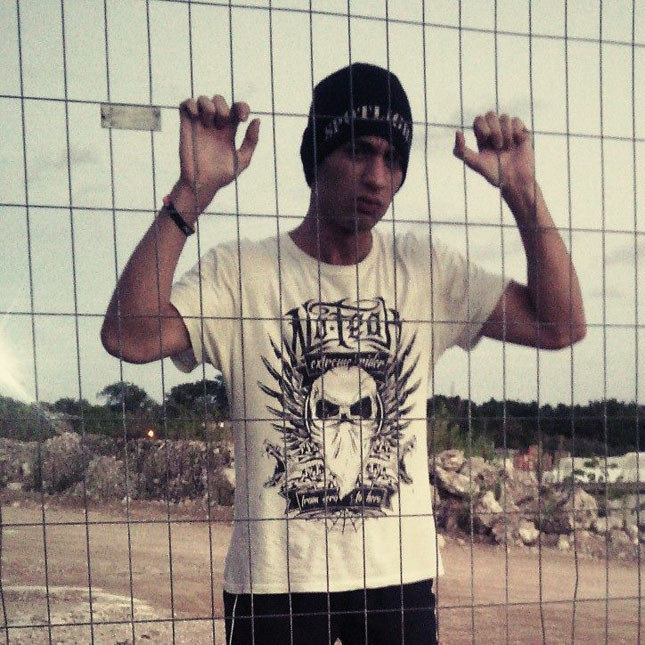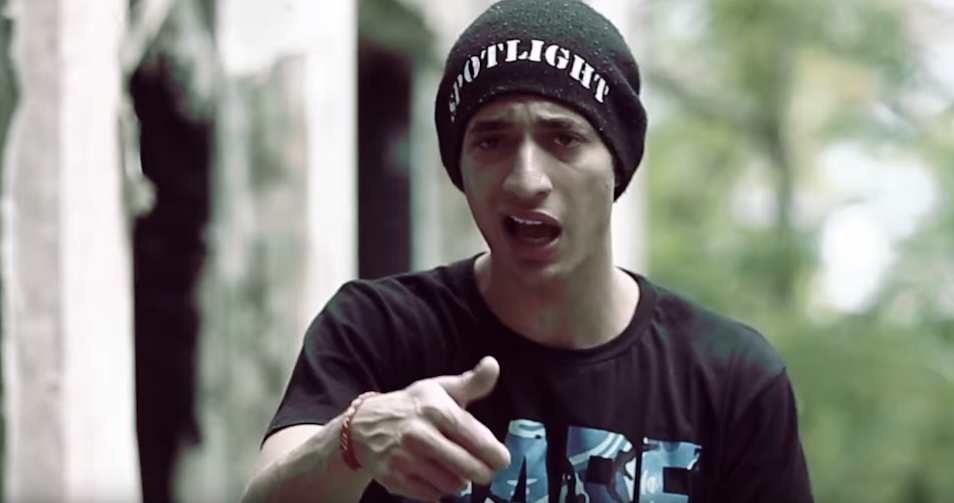"My name is Ali Kharsa. They call me MC. AK. I came all the way from Syria. Listen."

So begins the video clip for "Burning Bridges" by 18-year-old rapper Ali Kharsa. In his Michael Jordan t-shirt, standing in front of a nondescript industrial background, he looks like any other aspiring hip hop artist. The song has a sound that could have been produced in any suburban garage.
It starts with a swaggering bravado, talk of girls, fighting and excellence in freestyle rap.
But in the second verse the lyrics take a turn. There's talk of deadly toxins, running for your life, of "falcons eating a dead king's lions" and you realise that Ali Kharsa has gone through more than many other teenagers his age.
For him the burning bridges he raps about are all too real.
"I'm captured from inside, looking left and right
Running running can't breathe,
Just left the place like a thief,
Falcons eating a dead king's lions,
Heavens I see it like a fire
Toxin kill it all"
Ali Kharsa fled his hometown of Aleppo, Syria with his family when he was just 13 years old. They made it to Malaysia, but their troubles didn't end there.
"I left my motherland because of the war, I wanted to live in peace with my little siblings," he told BuzzFeed News.
"Our only choice was to immigrate to a peaceful country, a country who doesn't have any killing, a country that is easier to enter legally with our Syrian passports," he said.
But Ali's father didn't have the right to work, so they found it hard to get by.
"My father and I decided to sacrifice ourselves to get the family to a better country and the nearest one was Australia. In 2013, my father and I left the family and crossed the borders to Indonesia, illegally, as asylum seekers to seek asylum to Australia by boat."
Ali started writing music when he was placed in detention at the Australian regional processing centre in Nauru.

Like many asylum seekers who attempted the journey before him, because he tried to get to Australia by boat without a visa, he was locked up in the detention centre and told that he would never be resettled in Australia.
As detailed in several inquiries into conditions at the centre on the remote Pacific island, it is not a safe place for children. Caseworkers told a Senate inquiry about horrific living conditions including leaking tents and unexploded bombs in classrooms, as well as dozens of accusations of children being sexually abused by guards and other detainees.
Detention has been found to have a significant impact on the children's mental health. An independent review commissioned by the government found 17 children engaged in self-harm, including lip-stitching and attempted hanging. Guards address people by their boat number rather than their name.
So when Ali states "I'm a human being" in one of his songs, it's not just a fact, it's a powerful political statement.
"I'm just trying to voice my words on stage
So the people don't see refugees as a plague.
I feel like a bird only flightless
Hidden by the shadows of darkness."
"I started to write music when I was in detention. It calmed my strength down and I used to send political messages to the Australian government," he said.
"My rap was about reality and how oppressed and unfair life we had. It was about give us freedom, release us out."
MC.AK performing for refugee children in Nauru.
Ali formed a group with other detainees, who wrote in English, Arabic, Farsi and French, and they performed for other detainees.
"They strongly motivated me to keep it up and voice their pain on microphone," he said.
After some of the people from his group were relocated to other centres, he was encouraged by a staff member, who helped him record songs in his room.
"I met someone from the staff and he tried to record my music and he really did help me with sneaky recording of a few songs."
He writes about his dangerous five-day journey by boat in his song, "I Feel Like a Fighter." Produced with an online viral video maker, Ali relies on pictures found on the internet to tell his story. The lyrics reveal his young age and vulnerability on the open seas.
"In the boat for a couple of days,
Somewhere with the waves
Sleeping on my dad's shoulder"
In 2015, after two years in detention, Ali was granted refugee status and was allowed to move freely on the island. He met up with two local music producers who were able to film a proper video for him and enter him into a regional song competition.
Ali's story has a happy ending. This year, he was sponsored by family members and resettled in Canada.

He's still writing music, but now has the opportunity to study. Ali says he wants to release an album so he can tell people his story. He dreams of becoming a human rights lawyer so he can fight for refugees.
In an audio message for his friends still locked up in detention published on the Free The Children Nauru page, Ali shares a simple message of hope.
"I tell you what guys, you deserve to be in a better place and hopefully you will get out soon just like me. You'll leave and you'll find your way and you'll live your life just like every body else. So yeah, never back down and keep your heads up.
May god bless you, salute up from MC.AK, love you all."

